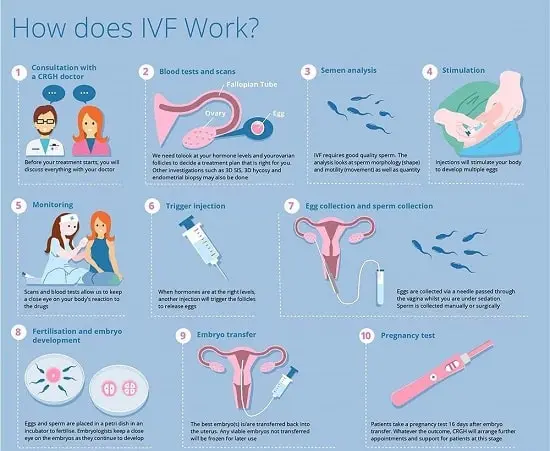When you undergo IVF treatment, you’ll undergo a series of procedures that will help
you create a baby. You will receive regular ultrasounds, blood tests, and hormone
injections. These hormones will help your eggs mature quickly, which increases your
chances of fertilization. In addition, you’ll have a minor surgical procedure called
follicular aspiration. This procedure is usually performed as an outpatient procedure
in your doctor’s office.
In vitro fertilization
During the In vitro fertilization treatment, a woman’s egg is fertilized by sperm
injected into her uterus. This fertilized egg is then transferred to a special growth
medium and left to grow for 48 hours. During this time, a baby is expected to form
from the six to eight cells that make up the egg.
The treatment is one of the most effective options for infertility, which is caused by
blocked or damaged Fallopian tubes, endometriosis, or other causes. It has also
helped women who have been unsuccessful in conception due to male factor
infertility. Similarly, in vitro fertilization is a good choice for women who have had
surgical sterilization.
Embryo transfer
Embryo transfer is the last step in the IVF treatment process. It is a relatively simple
procedure and is usually painless. A thin catheter is inserted into the woman’s
vagina or cervix. The embryos are then transferred through the catheter into the
uterus. Embryo transfer usually occurs about six to ten days after egg retrieval.
Following the procedure, the woman will have a few days to rest and should avoid
strenuous activity.
A woman undergoing IVF treatment should contact her doctor if she experiences
severe pain following the embryo transfer. She will be evaluated for any potential
complications, which can include severe ovarian hyperstimulation syndrome and
infection. The doctor will also take a blood sample to test for pregnancy about 12 to
two weeks after egg retrieval. If the woman tests positive, she will be referred to a
pregnancy specialist.
Sperm retrieval
Sperm retrieval is an integral part of in vitro fertilization (IVF) treatment. It helps
doctors fertilize an egg with sperm from a man’s own body. This process can be
performed using different methods. One method is intracytoplasmic sperm injection,
which involves injecting a single sperm into the egg. The goal of this procedure is to
maximize the chances of conception.
One of the methods used to collect sperm is the microscopic epididymal sperm
aspiration (MESA). This procedure is highly expensive and requires a high-powered
microscope. Another method is called percutaneous epididymal sperm aspirations
(PESA), which uses a needle to aspirate the sperm from the epididymis. PESA is less
invasive than MESA and can be performed under local or general anesthesia. PESA is
a better choice for men with obstructive azoospermia, as it can obtain large
quantities of mature sperm.
Egg donation
If you’re planning to undergo in vitro fertilization (IVF) treatment, egg donation is an
option. The process of finding a suitable egg donor is complicated and can take
months. It involves many legal and financial aspects, including signing a donor
contract. You’ll want to speak with a family reproductive law attorney before you
sign the contract. Your clinic may offer to pay for your legal counsel’s services, but
it’s always best to hire your own.
After the decision is made to use a donated egg, you’ll undergo a thorough
evaluation, much like the one done on couples who undergo routine IVF. The
evaluation will include a detailed medical history from both partners and will likely
involve testing for sexually transmitted diseases like HIV, hepatitis, and gonorrhea.
You’ll also be provided with counseling from a fertility specialist to ensure you’re
ready for the process.
Ovulation disorders
If you have ovulation problems, your doctor may recommend IVF treatment. IVF is a
safe and effective method for conceiving, but it does have risks. It increases the risk
of multiple births, particularly in females. There are also risks of premature delivery,
low birth weight, and developmental problems. Injectable fertility drugs can increase
the risk of multiples even further.
The first step is to diagnose the underlying causes of ovulation disorder. While some
disorders can be diagnosed through medical history and examination, others require
laboratory blood tests. Tests may include insulin and testosterone levels. Other
conditions, such as stress, may also affect a woman’s ability to conceive.
Infectious disease screening
If you are considering IVF treatment, your doctor may run certain tests before you
begin your treatment. Some of these tests are mandated by national standards of
care or law, while others are used to rule out issues that could reduce your chances
of conception or cause additional risk for you and your baby. If you are considering
using an egg donor, you may need additional tests such as blood testing for
cytomegalovirus. You may also need to undergo genetic consultation and
psychological screening.
Infectious disease screening is routinely performed before fertility treatment in ART
clinics around the world. Screening for HIV, hepatitis B, and C is mandatory in Israel.
It may also be necessary to screen your partner. tested for syphilis, HIV-1 and HIV-2, West Nile virus, and Zika virus.
Side effects of IVF treatment
IVF treatment involves the use of fertility drugs that affect a woman’s hormones.
Many women experience side effects from these drugs, which tend to subside within
a few days as hormone levels return to normal. Common side effects include
appetite issues, bloating, headaches, breast sensitivity, and mood swings.
One of the most common side effects of IVF treatment is bloating or tenderness due
to enlarged ovaries. The pain may last for 48 hours and then subside. However,
bloating can continue for a week. For those suffering from pain, acupuncture can
provide relief. Acupuncture can also help with nausea, decreased gut motility, and
anxiety


